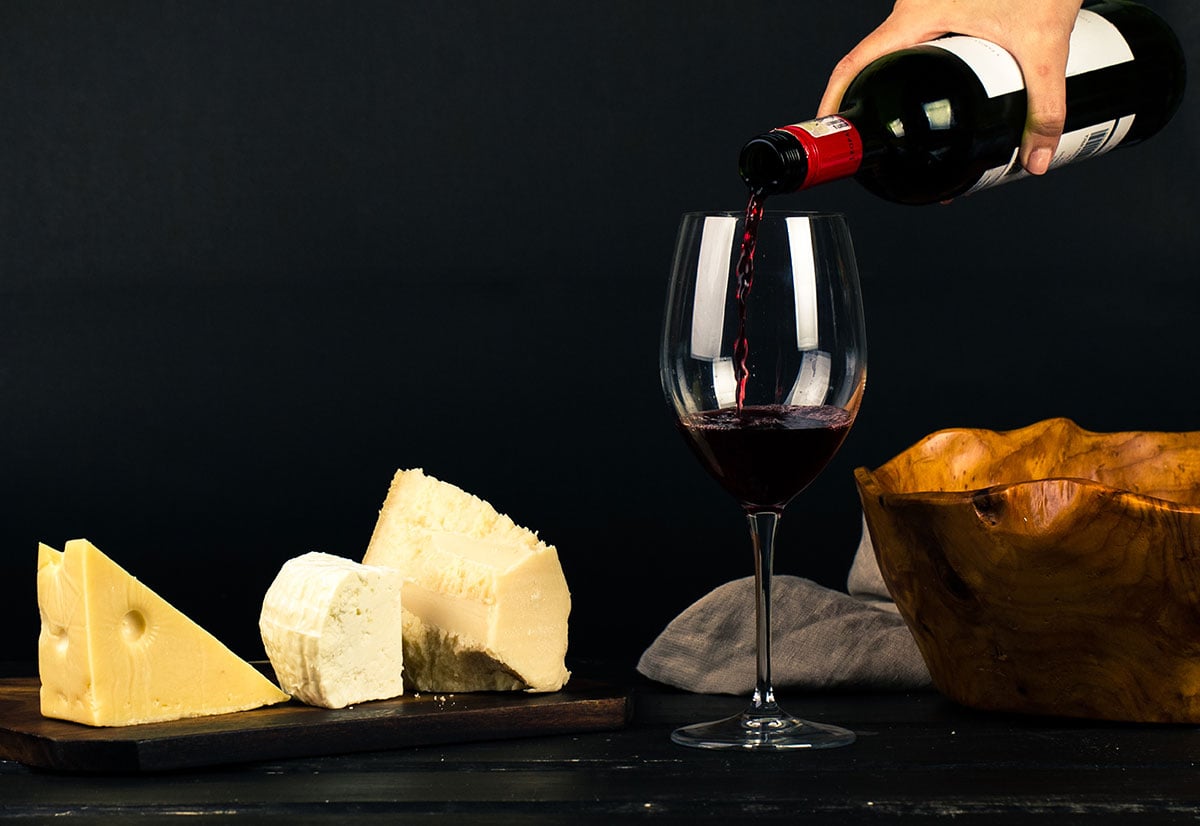

Wine and cheese may be one of the most iconic food and drink pairings on the planet, but that doesn’t mean that all cheese goes with any type of wine. There’s a reason why certain wines go better with certain cheeses, and thankfully, through years of tasting, there are plenty of recommendations for different cheeses to try with different wines.
In the past we’ve looked at what food pairs best with cabernet sauvignon, but today we’re going to be looking at what types of cheese pairs best with the wine.
Why Does Cheese Pair Well With Wine?
When it comes to wine and food pairings, the main goal is to enhance the flavor of both the food and the wine. You want to find a food and wine that will compliment each other and work together to provide the best flavor your mouth can experience.
When it comes to the art of wine and cheese pairing, the two have been synonymous for centuries. Wine and cheese have been produced alongside each other in the same regions for hundreds of years, which has led to the natural pairing of the two.
But what makes the two go together so well?
The answer to that lies in the fat content of the cheese and how that reacts with the tannins in the wine.
Tannins are what give wine that dryness, and what causes your mouth to feel dry when drinking it. After drinking a few sips of a dry wine, you’ll start to notice your mouth and tongue feeling “rough”, which can sometimes be unpleasant, and that’s where the fat in the cheese comes in.
The high fat content in the cheese will cause the tannins in the wines to bond with it instead of with our mouths, thus cutting back on the dry feeling you get when drinking the wine. The cheese can also enhance the different flavors that you’ll find in the wine, which leads to a better overall tasting experience.
If you’re not a big fan of dry wines, you may find them more enjoyable when drinking them alongside foods containing higher levels of fat.
What Cheese Pairs Well With Cabernet Sauvignon?
Now that we have a basic understanding of the reason why cheese pairs so well with wine, let’s take a look at what types of cheese pairs well with our favorite wine, Cabernet Sauvignon.
In general you can’t go wrong with a semi-hard cheese with some age to it. These cheeses can help enhance the flavor of the wine while balancing out the tannins that will make your mouth feel dry.
You’ll want to try and stay away from creamy or soft cheeses as they can make Cabernet Sauvignon taste a little bitter or metallic. Super hard cheeses can also enhance the tannins, thus making your mouth too dry.
Cheddar Cheese
It’s hard to go wrong with cheddar cheese. It’s simple, it’s tasty, it’s affordable, and it’s not too crazy for those who aren’t as adventurous with their cheese.
Sharp, Aged, Cheddar has just the right amount of flavor and fat content to help balance those tannins while tasting delicious at the same time. It will help bring out some of the citrus notes in the wine and acts as a great palate cleanser.
If you’re looking for something that everyone knows, and tastes great with cabernet sauvignon, then cheddar cheese is the perfect choice.
Gouda
Gouda is also a great cheese option for pairing to cabernet sauvignon. Its high fat content will help cut through the tannins just like the cheddar cheese does, and it will cut down on the dryness of the wine.
The aging process for this type of cheese does a great job of bringing out fruity notes in the wine while making bolder wines taste a bit lighter.
These two cheeses are our favorite cheeses to pair with cabernet sauvignon, but if you want to experiment with other cheeses, there’s no reason you can’t.
We do recommend sticking with semi-hard, aged, cheeses that have a higher fat content if you’re looking for the best option to pair with your cabernet sauvignon. The higher fat content will help in taking some of the bite out of the high tannin levels while the aged aspect will help bring out some of the fruit/berry notes in the wine.
The goal with wine and cheese pairing is to ensure that the wine and cheese both compliment each other and one doesn’t overpower the other. You don’t want a cheese that reduces the tannin’s effect completely because that would change the winemaker’s vision when creating the wine, and you don’t want a wine that overpowers the cheese because then you’re not enjoying the cheese. It’s a delicate dance when it comes to wine and cheese pairings, but feel free to experiment to find out what works for you.
